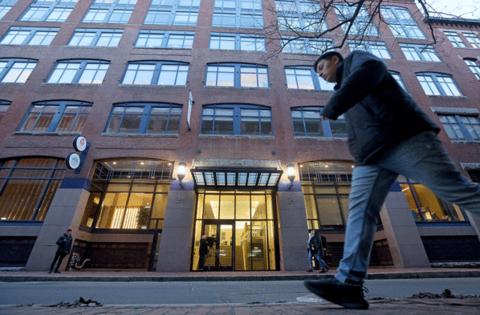Boston facing $1.7 billion budgetary shortfall from empty office buildings, report says
Published in News & Features
BOSTON — Empty office buildings have commercial values declining at a steadier clip than initially projected, as the City of Boston is hurtling toward a $1.7 billion budget shortfall in the next five years, a fiscal watchdog warns in a new report.
The latest numbers are more “daunting” than the roughly $1.4 billion budget shortfall that was projected in a similar report issued last year by the same local think tank, the Boston Policy Institute, in conjunction with The Center for State Policy Analysis at Tufts University — and drew backlash from City Hall.
“Empty offices continue to threaten Boston’s fiscal future, as once-attractive buildings sell for half their former value and property tax collections weaken faster than anticipated,” the watchdog report released on Thursday states. “A lack of decisive action, combined with a faster-than expected decline in tax assessments, has further darkened the outlook.”
BPI’s initial projection of a $1.4 billion shortfall, based on a 20-30% decline in office values over the next five years now reflects a “best-case scenario,” and appears “outdated and overly optimistic,” according to the report’s authors.
The fiscal watchdogs say their analysis, based, in part, on assessed values and the commercial real estate market, is pointing to a steeper 35-45% decline that could lead to a $1.7 billion revenue shortfall.
A worst-case scenario pushes that potential shortfall over $2 billion over the next five years, should a consistent hike in property taxes further depress office values, the report states.
A post-pandemic shift to remote work has led to today’s empty office buildings, which is leading to declining values that are eroding the city’s commercial tax base, the report states.
Office vacancy rates have climbed from 8% in 2019 to nearly 24% today, the report states.
Compounding matters is the city’s budgetary structure, which derives about three-quarters of its revenue from property taxes. Homeowners were hit with a double-digit spike in property taxes earlier this year, by way of falling commercial values that pushed more of the city’s tax burden onto the residential sector.
Should the city continue to raise property taxes, rather than pivot to alternative solutions, office and home values could be depressed even further in the coming years, according to the report. The budgetary shortfall would thus increase.
“This is a daunting prospect,” Gregory Maynard, executive director of the Boston Policy Institute, told the Herald. “This report should be eye-opening for people putting together the city’s budget.”
The report suggests that the city consider taking in less than the maximum amount of revenue allowable under state law, and cut spending in the budget, rather than continue to hike property taxes.
“Boston’s leaders sometimes imply that their budget is self-healing, that shortfalls cannot happen, and that the city can always collect the maximum amount of revenue allowable under state law,” the report states. “But there’s no magic here.
“The way shortfalls get filled, in the current budget process, is through automatic tax rate increases. And while that might be fine when the increases are small, large rate hikes carry substantial economic and political risk.”
Tax rates for homeowners stand to rise 25% over last year’s level by 2029, per the report, should the city choose not to adjust spending or reduce revenue expectations.
City Hall downplayed, and eventually outright dismissed BPI’s prior report that projected a more than $1 billion shortfall in Boston by 2029, as a result of office vacancies. Maynard is hopeful that the reaction will be different this time.
“I hope the mayor, I hope the administration takes this more seriously,” Maynard said. “I think the pushback that we got from City Hall last year was pretty dishonest. The mayor was calling the BPI report false information on the one hand, and then proposing a tax shift which was explicitly aimed at solving the problem that we identified on the other.
“I think what this makes clear is that the city needs to get serious about taking the health of downtown Boston much more seriously,” he said. “A few hundred office to residential conversion units is not a downtown revitalization plan, and it’s really clear the city needs to do a lot more.”
-------------
©2025 MediaNews Group, Inc. Visit at bostonherald.com. Distributed by Tribune Content Agency, LLC.







Comments